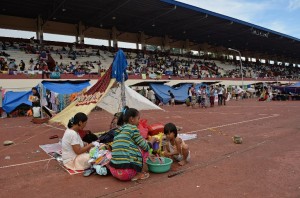
Refugees from Zamboanga conflict in 2013 photo. INQUIRER FILE PHOTO
WASHINGTON, DC – An international refugee assistance organization is calling attention to the conflict-ridden southern island of Mindanao, where it says thousands of ethnic minority families have been displaced for over a year without sufficient water and facing emergency-level malnutrition.
In its latest report, Philippines: Displaced and Forgotten in Zamboanga, Refugees International (RI) is urging the United Nations and donor governments to rapidly deploy more life-saving resources, contrasting the lagging attention to the Mindanao refugees with the critical international assistance provided to victims of Typhoon Haiyan.
It is also calling on the Philippine government not to force these internally displaced persons (IDPs) into sites where their basic needs will not be met.
In September 2013, the Philippine army and a faction of the Moro National Liberation Front clashed in the port city of Zamboanga on Mindanao, forcing 120,000 people to flee.
More than a year later, roughly 38,000 remain displaced, “living in deplorable conditions,” RI stated.
The IDPs are predominately Muslim and from ethnic minority groups who were poor and vulnerable even before they were displaced. RI said sites are overcrowded and IDPs receive roughly half the amount of drinking water deemed necessary under international standards. More than half of all children older than two years are reportedly malnourished, and child death rates have spiked repeatedly.
“The crisis in Zamboanga may be small compared to the aftermath of Typhoon Haiyan, but for individual families things are just as bad, if not worse,” said Alice Thomas, RI’s Climate Displacement Program Manager.
“The Philippine government declared that the humanitarian response in Zamboanga ‘ended’ in August, and since then many humanitarian agencies have drawn down staff or left altogether. Donors and aid agencies need to reverse this trend before more lives are lost,” she added.
In recent months, authorities in Zamboanga have tried to move IDPs who initially fled to the city’s outdoor sport complex to transitional sites. But at present, the sites lack adequate water and sanitation.
One of the largest is located in a remote area far away from schools and jobs. Many IDPs told RI that they had no desire to move there. And without bringing additional aid and services to those sites, conditions will only get more overcrowded and desperate. RI is calling on Philippine authorities to delay transfers until humanitarian standards can be met.
“Right now, Mindanao is experiencing a fragile peace which, if it holds, could transform this region,” Thomas added. “Forcing thousands of people into unsafe, unsanitary camps, or preventing them from moving home, will not move the peace process forward. That’s why Philippine authorities, donors, and aid agencies must act quickly and humanely to help Zamboanga’s IDPs to recover.”
RELATED STORIES
Muslim refugees in Zamboanga conflict observe Christmas with hope, family unity
Zamboanga refugees to be moved out of crowded camps by December –Soliman